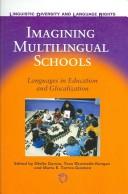| Listing 1 - 8 of 8 |
Sort by
|
Book
ISBN: 9781788921978 Year: 2018 Publisher: Bristol Blue Ridge Summit
Abstract | Keywords | Export | Availability | Bookmark
 Loading...
Loading...Choose an application
- Reference Manager
- EndNote
- RefWorks (Direct export to RefWorks)
Multi
ISBN: 9781788921978 9781788921961 Year: 2018 Publisher: Bristol ;; Blue Ridge Summit Multilingual Matters
Abstract | Keywords | Export | Availability | Bookmark
 Loading...
Loading...Choose an application
- Reference Manager
- EndNote
- RefWorks (Direct export to RefWorks)
Book
ISBN: 9781783096176 Year: 2016 Publisher: Bristol : Multilingual Matters,
Abstract | Keywords | Export | Availability | Bookmark
 Loading...
Loading...Choose an application
- Reference Manager
- EndNote
- RefWorks (Direct export to RefWorks)
Language and education --- Language and education. --- Multilingual education --- Multilingual education. --- Multilingualism.
Book

ISBN: 1281973416 9786611973414 184769120X 9781847691200 1847691188 1847691196 9781847691187 9781847691194 Year: 2008 Publisher: Bristol Blue Ridge Summit
Abstract | Keywords | Export | Availability | Bookmark
 Loading...
Loading...Choose an application
- Reference Manager
- EndNote
- RefWorks (Direct export to RefWorks)
This book explores the bidirectional relationship between language and poverty, from the perspectives of linguistics, language policy and planning, economics, anthropology, and sociology. On the one hand, poverty affects language survival; in modern times the fundamental determinants of language shift and language death are economic. On the other hand, the languages people speak, or don’t speak, can influence their economic status in substantial ways, limiting or facilitating access to jobs and education and full participation in the functions of the society. The issues encompassed by the twin themes of the volume have assumed growing significance in an era of increasing globalization and accelerating change in economies, technologies and traditional social structures. They are of practical concern to people in a wide range of disciplines and professions, including politicians, educators, social workers, language planners, and others who work and live in multilingual contexts.
Language and languages --- Language maintenance. --- Poverty. --- Sociolinguistics. --- Language and society --- Society and language --- Sociology of language --- Language and culture --- Linguistics --- Sociology --- Integrational linguistics (Oxford school) --- Destitution --- Wealth --- Basic needs --- Begging --- Poor --- Subsistence economy --- Language loyalty --- Maintenance of language --- Sociolinguistics --- Economic aspects. --- Social aspects --- Sociological aspects --- Maintenance --- Language and languages Economic aspects --- Economic aspects
Book

ISBN: 1847696856 1282465945 9786612465949 1847691919 9781847691910 9781847691903 1847691900 9781847691897 1847691897 9781282465947 9781847696854 6612465948 Year: 2009 Publisher: Bristol Blue Ridge Summit
Abstract | Keywords | Export | Availability | Bookmark
 Loading...
Loading...Choose an application
- Reference Manager
- EndNote
- RefWorks (Direct export to RefWorks)
The principles for enabling children to become fully proficient multilinguals through schooling are well known. Even so, most indigenous/tribal, minority and marginalised children are not provided with appropriate mother-tongue-based multilingual education (MLE) that would enable them to succeed in school and society. In this book experts from around the world ask why this is, and show how it can be done. The book discusses general principles and challenges in depth and presents case studies from Canada and the USA, northern Europe, Peru, Africa, India, Nepal and elsewhere in Asia. Analysis by leading scholars in the field shows the importance of building on local experience. Sharing local solutions globally can lead to better theory, and to action for more social justice and equality through education.
Education, Bilingual. --- Multicultural education. --- Minorities --- Linguistic minorities --- Minority languages --- Language and languages --- Sociolinguistics --- Minority students --- Intercultural education --- Education --- Culturally relevant pedagogy --- Bilingual education --- Bilingualism --- Multilingual education --- Education. --- Political aspects --- Culturally sustaining pedagogy --- Education, Bilingual --- Multicultural education --- Minorities - Education --- Linguistic minorities - Education --- Minoritized languages
Digital

ISBN: 9781847691200 9781847691187 Year: 2008 Publisher: Bristol ;; Blue Ridge Summit Multilingual Matters
Abstract | Keywords | Export | Availability | Bookmark
 Loading...
Loading...Choose an application
- Reference Manager
- EndNote
- RefWorks (Direct export to RefWorks)
Digital

ISBN: 9781847691910 9781847691903 Year: 2009 Publisher: Bristol ;; Blue Ridge Summit Multilingual Matters
Abstract | Keywords | Export | Availability | Bookmark
 Loading...
Loading...Choose an application
- Reference Manager
- EndNote
- RefWorks (Direct export to RefWorks)


ISBN: 9781853598968 9781853598951 Year: 2006 Publisher: Bristol ;; Blue Ridge Summit Multilingual Matters
Abstract | Keywords | Export | Availability | Bookmark
 Loading...
Loading...Choose an application
- Reference Manager
- EndNote
- RefWorks (Direct export to RefWorks)
| Listing 1 - 8 of 8 |
Sort by
|

 Search
Search Feedback
Feedback About UniCat
About UniCat  Help
Help News
News